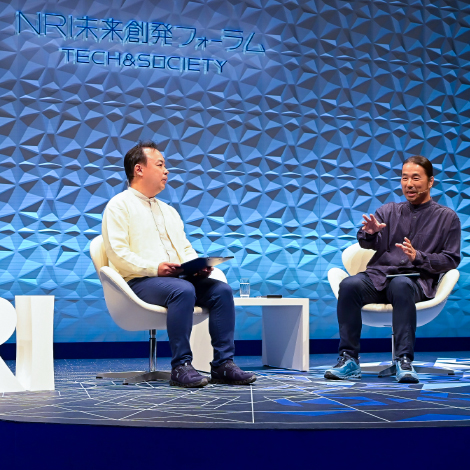Leveraging the Strengths of Japanese Companies to Lead Smart Cities with “Digital General Contractor” Functions
#DX
May 08, 2019
Smart Cities are designed to optimize urban infrastructure, facilities, and operations, as well as improve convenience and comfort for businesses and consumers. This is done by collecting data from sensors around the city and integrating and analyzing it using AI and further remotely controlling facilities and equipment. Not only central and local governments but also IT platformers such as GAFA (Google, Amazon, Facebook, Apple) and Alibaba, are working on smart cities. In this environment, what should Japanese companies do to demonstrate their presence and acquire business opportunities? We asked Takamasa Mataki, Keitaro Ishigami, and Eiichiro Takami of Nomura Research Institute (NRI), specialists in city planning and smart cities, about the challenges and issues involved.
Smart Cities Evolve with Technological Advances
―― Smart cities have attracted attention in the past as well, so why is this theme being brought up now?
The smart cities of 10 years ago, also called "smart communities," focused on using ICT to efficiently utilize energy. In recent years, the concept of using AI (Artificial Intelligence) to further support and optimize urban activities from a data perspective has been added to it. For instance, by installing sensors around the city to track people's movements, we can increase the lighting in places prone to traffic accidents or crimes, and reduce the lighting in streets where the pedestrian movement or crime rate is low. This is one of the efforts being made to reduce utility expenses and optimize control.
This is due to the fact that currently, communication technologies for sending large volumes of data are in place, the prices of data collection devices or storage such as sensors have fallen, and AI technologies for analyzing data have improved.
Although Western countries are the driving force behind these new smart cities, these initiatives have recently accelerated in China and emerging countries, who are taking up new social experiments one after the other. The Japanese government and corporations are becoming increasingly concerned about this.
―― What types of companies have business opportunities in smart cities?
In the structure of a city, the first layer consists of civic infrastructure such as roads, water, and electricity, as well as information and communication infrastructure. On top of this are built buildings and other edifices, forming a multi-layered arrangement that provides a variety of services including control and transportation systems to make it function as a city. As every layer can be smart, there are business opportunities not only for infrastructure businesses or management companies, but also for a wide range of other companies including real estate, trading, manufacturers, telecommunications carriers, and SI vendors.
Cutting-Edge Technology and Service Laboratories
―― Yet, the hurdles for private companies wanting to take action at the city level seem to be high.
If we are only to create easy-to-live and convenient cities, it will not be a problem even if we are behind the leading overseas companies. However, the competitiveness of Japanese companies is a cause for concern. Leading companies in Europe, North America, and China are using information to make society more convenient. They are thinking about ways to introduce state-of-the-art technologies, which are currently being developed, into future cities, and are participating in town planning in an effort to get these out to the world at the earliest. If this situation continues, we will start lagging behind in terms of technological capabilities.
In addition, having information on consumers is now one of the factors leading to success in business. If other countries and companies have a monopoly on smart cities, it could have an impact on our businesses going forward. In order to compete in the smart city field, it is important to take an integrated view of not only our business domains but also of certain areas or cities as a place for business.
―― Could you elaborate on what you mean by taking an integrated view?
For example, when constructing a building, we usually draw the blueprints, determine the partition, wiring, and piping, finalize the locations for equipment, and ultimately test it by actually constructing it. This was the main role of conventional general contractors.
On the other hand, when constructing a smart building, we have to keep in mind an overall picture focusing on ICT and service functions that were not previously necessary. For instance, we must consider where sensors and surveillance cameras should be placed so that they are convenient and easy to manage, or how to incorporate a communication control system to eliminate staircases in the building so that robots can move around autonomously. To design and operate smart cities, it is essential to have the ability to integrate town planning, infrastructure, equipment, and ICT, which is what we call the digital general contractor function.

Gaining an Edge with Digital General Contractor Functions
―― Do overseas platformers play the role of a digital general contractor?
That's not true. Digital companies are not familiar with actual facilities and town planning, so they are urgently recruiting people with expertise. To be a digital general contractor, one needs resources with a wide range of expertise, including urban development, real estate development, data analysis capabilities, system construction and requirement definition capabilities, and business architecture designing capabilities.
Japanese companies possess advanced technologies in a variety of fields as well as the ability to implement them. If they are able to hold down their functions as digital general contractors, there is a growing possibility that they will control the movement of smart cities in the future. Because of the need for multifunctional activities, it is necessary to form teams and mobilize the knowledge that is scattered throughout the company. Collaboration with other companies and organizations is also important. However, in many cases, collaboration efforts are hindered by organizational barriers. NRI would like to help Japanese companies solve this problem and build a digital general contractor function.







